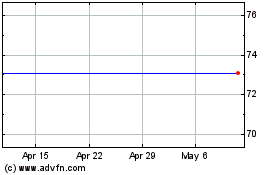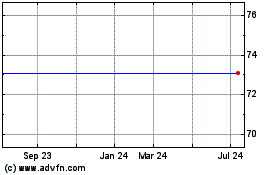China's foreign-exchange reserves fell to the lowest level in
more than three years in January, raising questions about how long
Beijing can keep burning through the rainy-day funds to defend the
yuan without triggering a huge flight of capital.
The People's Bank of China said Sunday that the world's largest
stockpile of foreign currency plunged by $99.5 billion last month,
to $3.23 trillion. The drop follows a record $107.9 billion plunge
in December and continues a decline that picked up speed in August,
as China's exchange-rate policies started to appear to be in
flux.
In mid-August, the central bank unexpectedly devalued the yuan,
saying it wanted to bring its value more in line with market
forces. But the action backfired, as investors sold the currency in
panic fashion, forcing the Chinese central bank to dig into the
reserves to stabilize it.
Last month, the central bank again had to draw on the reserves
in the wake of a botched effort to guide the yuan weaker, a move
that sparked fears of a deeper-than-expected slowdown in China's
economy, setting off a sharp selloff in global markets for stocks
and commodities.
Many investors and analysts are questioning the central bank's
ability to continue such interventions. Already, the central bank
is finding itself in a vicious cycle: As it repeatedly draws on the
reserves to prop up the yuan, doubts grow about its ability to keep
the currency stable, which then causes more money to leave the
country, eroding the reserves further.
"It likely will be a long battle," said an official at China's
central bank. The official cited the difficulties of stabilizing
the currency and managing investors' expectations as the economy
slows. "But China still has sufficient reserves to withstand any
external shocks," the official said.
The news will only add to traders' anxiety heading into Monday.
While some analysts were expecting an even larger outflow, the
decline in the central bank's stockpiles is likely to contribute to
concerns that China could be forced by deteriorating domestic
economic conditions to again devalue the yuan.
Chinese leaders have ruled out for now the possibility of a
one-off sharp devaluation of the yuan as urged by some economists
and investors, saying that would undermine Chinese purchasing power
just as the government is trying to shift to an economy driven by
consumption.
But many investors view a possible decline in the yuan as the
greatest risk facing financial markets, contending that it could
spur rounds of competitive devaluations across the emerging world
as China's trade partners mimic its actions in a bid to defend
precious export growth at a time when nearly all nations around the
globe are struggling with inadequate domestic demand for goods and
services.
The drop in China's foreign reserves was smaller than expected,
which probably would make people less nervous about China for now,
said Gerardo Rodriguez, a portfolio manager of emerging markets at
BlackRock. Still, "people need to find out more details to have a
better understanding of the factors that could be explained for the
[smaller-than-expected] decline," he said.
Markets in recent months have been rattled by a broad retreat
from riskier investments, and a corresponding flight into safe
government debt, amid investor fears that China's problems, slowing
global growth and turmoil in emerging markets could spill over into
what has been the strongest-performing large economy in recent
years, the U.S.
While broad stock indexes have largely stabilized since a rout
of the first two weeks of 2016 that was fueled by a free fall in
the price of crude oil, prices of stocks, bonds, currencies and
commodities have remained volatile. A sharp selloff in technology
stocks on Friday, along with a softer-than-expected U.S. employment
report, underscored the lingering fears that the U.S. could be
headed for a recession that would likely spur further selling of
shares and lower-rated bonds around the globe.
"We're in an environment where there's so much fear and
uncertainty from a lot of perspectives," said Lew Piantedosi, head
of growth investing at Eaton Vance.
The notion that China has lost a measure of control over its
currency is new to a country long criticized for its iron grip to
ensure the yuan didn't appreciate in a way detrimental to its
exporters. Similarly, the recent plunge in China's reserves is a
contrast to years of buildup in the pile of cash as China's economy
and export sector boomed.
One question now is how much foreign currency China actually
needs to have in reserve. When the reserves peaked in mid-2014 at
nearly $4 trillion, Chinese officials were concerned that the
stockpile had become too big to manage efficiently. Much of the
reserves are in low-yielding U.S. government bonds.
The current $3.23 trillion still gives Beijing a large war chest
to meet its obligations to foreign creditors. About half of China's
external debt outstanding, which stands at $1.53 trillion, is
yuan-denominated debt raised overseas, data from the central bank
show.
But the reserves appear to be less than abundant if gauged by
another measure, the ratio of the currency reserves to M2, or the
broad money supply This includes assets such as savings deposits
and money-market funds as well as cash. The International Monetary
Fund, the World Bank and others use the ratio to gauge the
sufficiency of countries' exchange reserves. The higher the ratio,
the lower the likelihood of huge flight into other currencies.
Based on that measure, China should maintain between $2.13
trillion and $4.26 trillion worth of currency reserves to fend off
any destructive capital outflow, estimates Zhang Ming, a senior
economist at the Chinese Academy of Social Sciences, a government
think tank.
"Whether China can keep adequate foreign-exchange reserves will
depend on what the central bank is up to," Mr. Zhang said. If the
central bank intends to continue to intervene heavily to keep the
yuan stable, he said, "the current level of reserves may not be
adequate enough."
On the other hand, he said, if the central bank presses ahead on
giving the market bigger sway in the exchange rate by reducing
intervention and at the same time tightens capital controls, "the
reserves will undoubtedly be enough."
The People's Bank of China has been doing both, prioritizing the
yuan's stability over market reforms. In recent weeks, while
intervening to prop up the currency, the bank has imposed fresh
controls aimed at preventing money from leaving the country. That
strategy has confused investors both inside and outside China,
resulting in both businesses and individuals rushing for the
exit.
Western officials including U.S. Treasury Secretary Jacob Lew
and the International Monetary Fund's Christine Lagarde recently
have urged Beijing to better communicate its policy intentions with
the market.
Senior Chinese officials said in recent weeks that they
recognize the need for clearer communication to avoid roiling
global markets. That said, they ruled out for now the possibility
of a one-off sharp devaluation of the yuan as urged by some
economists and investors, saying that would undermine Chinese
purchasing power just as the government is trying to shift to an
economy driven by consumption.
"A sharp weakening of the yuan is not in China's interest," said
an official close to the leadership. Executives at China's top four
state-owned banks, which are among the market makers in China's
currency trading, say the central bank appears to be holding the
line at 6.6 yuan per dollar in the near term.
The plunge in China's currency reserves also reflects a smaller
flow of foreign investment into China and greater demand for
foreign currencies by Chinese companies and individuals.
Du Hanbin, an exporter in the southern Chinese boomtown of
Shenzhen, said that since late last year, his company, a toy and
furniture maker that mainly sells to the North American market, has
been hoarding its dollar revenues rather than converting them
immediately into yuan, also known as the renminbi. "The dollar is
strong and the renminbi is depreciating," Mr. Du said. "I want to
minimize my losses by holding on to the dollar."
The scale of China's capital outflows is larger than the net
decline in its reserves, as the latter reflects foreign currency
coming into the country as part of foreign investment. An analysis
by GavekalDragonomics, a research firm specializing in China's
economy, estimates that the country's outflows topped $700 billion
last year, while central-bank data show currency reserves dropped a
total of $512 billion in 2015.
Liyan Qi contributed to this article.
Write to Lingling Wei at lingling.wei@wsj.com
(END) Dow Jones Newswires
February 07, 2016 20:15 ET (01:15 GMT)
Copyright (c) 2016 Dow Jones & Company, Inc.
Eaton Vance (NYSE:EV)
Historical Stock Chart
From Mar 2024 to Apr 2024

Eaton Vance (NYSE:EV)
Historical Stock Chart
From Apr 2023 to Apr 2024
